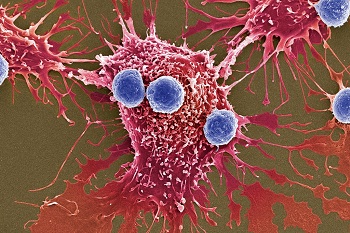Genetically modified microbes release “nanobodies” that alert the immune system to cancer in mice, scientists report.
Scientists have used genetically reprogrammed bacteria to destroy tumors in mice. The innovative method one day may lead to cancer therapies that treat the disease more precisely, without the side effects of conventional drugs.
The researchers already are scrambling to develop a commercial treatment, but success in mice does not guarantee that this strategy will work in people.
“At some point in the future, we will use programmable bacteria for treatment,” said Doctors “we think there’s just too much potential.”
Our immune cells can sometimes recognize and destroy cancer cells without assistance. But tumors may hide from the immune system by taking advantage of a gene called CD47.
Normally, the gene makes a protein that studs the surface of red blood cells, a kind of sign that reads, “Don’t Eat Me.” Immune cells see it, and pass by healthy red blood cells.
But as red blood cells age, they lose CD47 proteins. Eventually the immune cells no longer give them a free pass, gobbling up old cells to make way for new ones.
Mutations in cancer cells can cause them to switch on the CD47 gene. The immune system sees these cells, too, as harmless, allowing them to grow into dangerous tumors.
In recent years, scientists have been developing antibodies that can attach to CD47 proteins on cancer cells, masking the “Don’t Eat Me” sign. Then the body’s immune cells learn to recognize the cancer cells as dangerous and attack.
But standard antibodies are big molecules that can’t burrow into a large tumor. And since they have to be injected into the bloodstream, these antibodies end up everywhere in the body, causing side effects.
Bacteria cannot make normal antibodies for CD47. But recently, Doctors developed a tiny version of the molecule called a nanobody.
Not only are nanobodies small enough for bacteria to produce, they’re also much more potent than conventional antibodies.
The researchers inserted the nanobody gene into the bacteria, turning them into nanobody factories. Then the team injected five million of the altered microbes into mouse tumors.
The bacteria were also programmed to commit mass suicide. After they established themselves and multiplied, 90 percent of the bacteria ripped themselves apart, spilling out nanobodies.
The nanobodies attached to CD47 proteins on the cancer cells, robbing them of their camouflage.
In addition, fragments of the dead bacteria leaked out of the tumor. These bits of debris drew the attention of immune cells, which attacked the uncloaked cancer cells.
When Doctors originally developed their CD47 nanobody, they recognized that transporting it to cancer cells would be crucial to its effectiveness. But he never imagined that someone would hide it inside a microbial Trojan Horse.
Doctors cautioned that the genetically reprogrammed bacteria might not be as powerful in people as they seem to be in mice.
“We have basically the same plumbing, but just on a much larger scale,” they said. “What that means is that stuff doesn’t as efficiently move from one part of a person to another.”
“These things are not just seen as crazy things to play with,” said Doctors. “They potentially could actually make their way into patients.”
Lara Khouli

